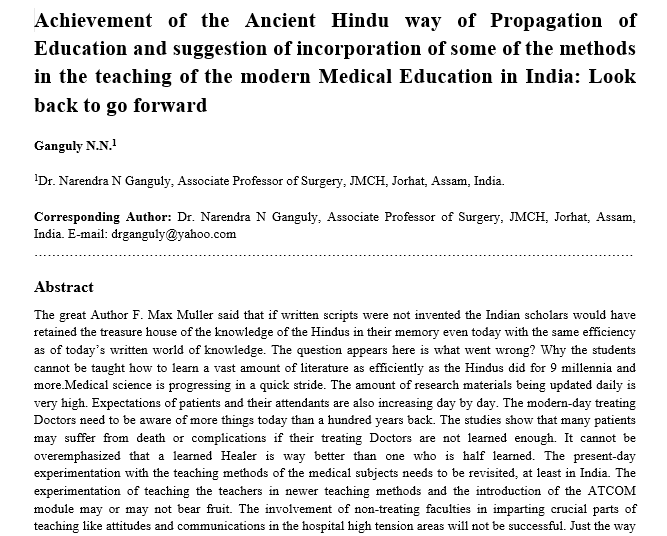Achievement of the Ancient Hindu way of Propagation of Education and suggestion of incorporation of some of the methods in the teaching of the modern Medical Education in India: Look back to go forward
Abstract
The great Author F. Max Muller said that if written scripts were not invented the Indian scholars would have retained the treasure house of the knowledge of the Hindus in their memory even today with the same efficiency as of today’s written world of knowledge. The question appears here is what went wrong? Why the students cannot be taught how to learn a vast amount of literature as efficiently as the Hindus did for 9 millennia and more.Medical science is progressing in a quick stride. The amount of research materials being updated daily is very high. Expectations of patients and their attendants are also increasing day by day. The modern-day treating Doctors need to be aware of more things today than a hundred years back. The studies show that many patients may suffer from death or complications if their treating Doctors are not learned enough. It cannot be overemphasized that a learned Healer is way better than one who is half learned. The present-day experimentation with the teaching methods of the medical subjects needs to be revisited, at least in India. The experimentation of teaching the teachers in newer teaching methods and the introduction of the ATCOM module may or may not bear fruit. The involvement of non-treating faculties in imparting crucial parts of teaching like attitudes and communications in the hospital high tension areas will not be successful. Just the way a great Chef cannot train a Sniper, the same way this will surely fail. The proper person at a proper teaching position should be followed. A short advanced course in Medical Education, A short Fellowship or publication of few papers on education will not convert a Nontreating faculty equivalent to the faculty of Surgery. Theoretically, it sounds good,but in reality, it probably won’t work. The students would bein confusion. How can a teacher who has never faced a murderous mob or faced an intra-operative death or even diagnose a patient to cure him/her would teach how to behave in such scenarios? In such chaos, we thought of looking back on the historical aspects of the ancient medical education system and see if the great wisdom of the Hindu civilization can be utilized to improve the present Medical education system in India.It cannot be denied that the ancient Hindus had a system of Medicine far superior to whatever existed in the west.Great treatises were written in later times. These were learned and remembered by the students quite efficiently. The students often raised the standards to higher than those of their teachers. Such an efficient system needs to be paid attention to and if possible initiate some steps to bring back the great and lost glory of the system of medicine in practice. Teachers of the ancient period were known by the names of Acharya, Upadhyay, Charakas, and Guru.The learning methods were Storytelling, Memorization, hands-on methods, Critical analysis, Seminar, and finally Question – Answer sessions.The great Sushruta, maintained that Surgery was the most important subject of all. It was considered the first and foremost of the medical subjects. Maybe this should be looked into and Surgeons are brought in to take care of the higher medical education programs to make the teaching of the Higher medical learning strong and efficient.In this work, we tried to focus on such steps, which is incorporated in the education system of modern medical science in India, should improve the quality of the students. As a result, they will be better healers, and lives will be saved.
Downloads
References
Muthu C. A Short Review of the History of Ancient Hindu Medicine. Proceedings of the Royal Society of Medicine. 1913 May;6(Sect_Hist_Med):177-90.
Kirkpatrick EA. Fundamentals of Child Study: A Discussion of Instincts and Other Factors in Human Development, with Practical Applications. Macmillan; 1917.
Kalam Chouhan. Education system in ancient India. Int JHist Res.2016;6(2):1-4
Nogendra Nath Mazumderwith an introduction by E. E. Biss. Ahistory ofeducationinancient Indiaby:Macmillan & Co, ltd.Calcutta.
Buhler G. Manusmriti: The Laws of Manu. Translated with extracts from seven commentaries, Sacred Books of the East. 1886;25.
Müller FM. Lectures on the origin and growth of religion as illustrated by the religions of India: delivered in the Chapter House, Westminster Abbey. Longmans, Green, and Company; 1878.
Seal B. The positive sciences of the ancient Hindus. Longmans, Green and Company. 1915.
Subbarayappa BV,The roots of ancient medicine: an historical outline. J Biosci. 2001;26(2):135-143. Available at https://www.ias.ac.in/article/fulltext/jbsc/026/02/0135-0143.
Ganguly N, Phukan Ray R. Infusing Teaching methods in the Medical Education System in India from the wisdom of the ancient Buddhist teaching ways, will improve the quality of the treating Doctors.WJPMR. 2019;5(11):55-59.
Ganguly N, Phukan Ray R. Methods of teaching in Islam and incorporating certain ideas into the teaching of the modern medical Science in India: Some thoughts and some observations. Int J Med Res Rev. 2019;7(6):568-73. Available from: https://ijmrr.medresearch.in/index.php/ijmrr/article/view/1099

Copyright (c) 2020 Author (s). Published by Siddharth Health Research and Social Welfare Society

This work is licensed under a Creative Commons Attribution 4.0 International License.


 OAI - Open Archives Initiative
OAI - Open Archives Initiative


